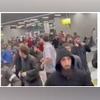As Russia's war effort fuels economic growth and drives up wages, air travel has been on the rise too, with Russians defying Western sanctions by heading to domestic holiday spots or "friendly" countries where they are still welcome.
However, just as soaring government spending on the war in Ukraine is fuelling a consumer spending boom and more and more people chose to spend the extra cash on travel, Russia's civil aviation sector is struggling to take advantage of booming demand.
The reason? Russia just does not have enough planes.
While the sanctions fell short of the desired effect of crippling Russia's economy and starving its war machine, they did cut off the supply of planes and parts, which domestic production could not replace.
As a result, fewer new planes could be added to Russia's fleet to meet rising demand and Moscow was forced to ask neighbouring countries to help run some domestic routes.
Also Read
Russia has touted its economic resilience in the face of sanctions, but difficulty in ending its reliance on Western planes highlights the limits to Moscow's goal of breaking free from Western influence and having domestic industries pick up the slack.
With most of Europe's airspace closed to Russian carriers, most traffic shifted to domestic routes, data from Russia's civil aviation watchdog Rosaviatsia shows. International travel has pivoted to countries that have not imposed sanctions on Moscow, such as Turkey, ex-Soviet countries and the United Arab Emirates, according to data from the FSB security service, which tracks border crossings.
Egypt, Thailand and China have also gained in popularity compared with pre-pandemic levels.
By contrast, the numbers of passengers flying to Europe have dropped to a few hundred thousand from almost 10 million in 2019, the data showed.
PRODUCTION DELAYS
Russia's retail sales, a key gauge of consumer demand, rebounded strongly last year from a 2022 slump and while that growth has softened in recent months, rising incomes continue to drive demand for air travel, cars and consumer goods, including those imported from the West via third countries.
"Yesterday these people earned relatively little, now they have not just extra, but beyond extra, income relative to what they had, and many of them have ... used this for a fully-fledged summer holiday," aviation expert Oleg Panteleev told Reuters.
Matching that demand, however, is a challenge.
Almost 80 per cent of Russia's fleet is foreign-made, data from Swiss aviation intelligence provider ch-aviation shows. Airbus and Boeing planes account for 575, or two-thirds, of Russia's 865-strong fleet.
Their pullout was initially hailed as a win for the domestic industry.
"The competitors left. Just a few years ago the domestic aviation industry could only dream of this," Sergei Chemezov, head of industrial conglomerate Rostec, told Reuters in August.
Rostec, whose subsidiary United Aircraft Corporation controls almost all of Russia's major aircraft producers, appears still far from making that dream a reality.
In the year before invading Ukraine, Russia added 54 new commercial aircraft to its fleet - 27 from Airbus, three from Boeing and 24 Russian-made Sukhoi Superjets - for airlines including flag carrier Aeroflot, S7, Red Wings, Rossiya, and Ural, ch-aviation data shows.
In the nearly three years since, it has added just 11 new planes, all of them Superjets.
Production of Russia's new MS-21 airliner, being made by Rostec, has already been pushed back to 2025-2026 from 2024.
Chemezov acknowledged Russia was facing difficulties but said it would definitely make its own passenger planes.
The Kommersant daily reported last week that Russian airlines, unable to repair Airbus A320 neo engines, may have to retire some of its Airbus fleet.
Rosaviatsia said Russia's serviceable Airbus A320 neo fleet had got smaller, but it accounted for less than 5 per cent of Russia's commercial aircraft. Sanctions on Russian aviation have further complicated existing engine issues, Rosaviatsia said.
NEIGHBOURLY HELP
Moscow has spent at least 1.47 trillion roubles ($13 billion) in state subsidies and loans since the invasion on the aviation sector, according to a Reuters analysis, as Russia pursues President Vladimir Putin's goal of producing more than 1,000 aircraft by 2030.
Yet for now, Russia has asked Central Asian countries to help it run some domestic routes, while The Economic Times of India reported that Russia has asked India and China for assistance, too.
As Moscow becomes increasingly dependent on Beijing for trade, technology and political support, air travel is the latest link being forged between the two nuclear powers.
"China is building up its positions very strongly," Panteleev said. "Russian tourists are gradually beginning to rediscover China."

)